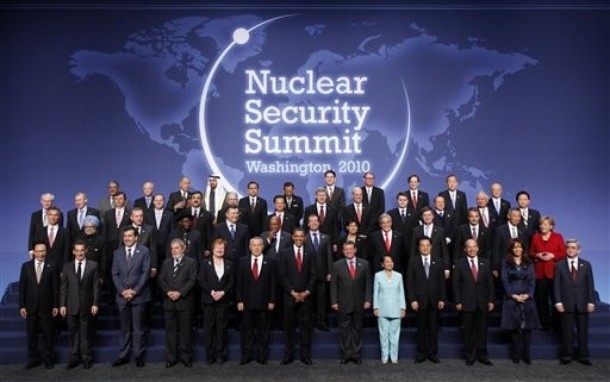Could al Qaeda set off a nuclear weapon?

What did President Obama achieve during the just-concluded nuclear summit? Max Bergmann says a lot:
Bilateral deals were struck with the Ukraine, Chile, Canada, Mexico â?? all agreeing to give up their stockpiles of highly-enriched uranium. Furthermore, Russia agreed to eliminate 68 tons of weapon grade plutonium, enough for 17,000 nuclear weapons. Other countries agreed to additional steps to improve port security and to address nuclear trafficking.Additionally, the final communique from the summit achieves a consensus on the dangers of nuclear terrorism and it gets nations to make commitments to secure all their vulnerable nuclear materials within four years. Importantly, it lays out a â??work planâ? for countries to follow and to ensure countries live up to these pledges, South Korea will hold a follow-up nuclear summit in two years to put pressure on countries to follow through.
All very sensible achievements in my view. But consider the scope of the conference. According to the Times, it was "the biggest gathering of heads of state by a US leader since the founding of the UN in 1945." Was a similarly historic agreement hammered out? It doesn't appear so.
I do think there was an unfortunate element of hysteria that pervaded the summit - what Spencer Ackerman might disparage as "the politics of fear." Obama invoked Albert Einstein to the effect that the world was "drifting toward a catastrophe beyond comparison."
So what are the chances that al Qaeda could acquire, transport and detonate a nuclear weapon into the continental United States? We know they have tried in the past (and have been scammed in the process) and presumably are trying to do so now, but some things may simply be beyond the means of even the most motivated terror organization. Consider, as RCW contributor Todd Crowell highlighted recently, the experience of the Japanese terror cult Aum Shinrikyo. They had a large facility for producing chemical weapons, a nuclear lab in Australia and were well funded and the best they were able to do was the 1995 Tokyo subway attack which killed 13 people with Sarin nerve gas. A tragedy, yes, but not a "catastrophe beyond comparison."
And, as Michael Brenner observes the al Qaeda threat today is not what it once was:
Obama made this the leitmotif of the conference in his public remarks yesterday to the effect that terrorism is the most important nuclear threat we face. That is simply untrue. An accurate statement designed to educate rather than to play on emotions would say that the seizure of nuclear materials by â??al-Qaedaâ?? would create a vitally dangerous situation BUT it is not an urgent concern because the likelihood of such an eventuality coming to pass is close to zero. The old al-Qaeda is a weak, fragmented grouping able to do little more than survive physically. This is the outfit that, over the past 8 + years, has been capable of organizing nothing of great consequence. The London and Madrid bombing were essentially local operations; the Christmas bomber incident rank amateurism. Trying to blow a plane out of the sky once every several years is not a laughing matter; but to cite it to stoke fears of nuclear terrorism is rank scare-mongering with no evidential basis. Right out of the Bush-Cheney playbook. An outfit that cannot manage to get its hands on fire-retardant underwear will not be able to build or steal a nuclear warhead.
The fact that al Qaeda is a shell of its former self is no reason not to lock up loose nuclear materials. They could still surprise us, there could be other organizations similarly determined to cause havoc, or even deranged individuals that might want to get their hands on fissile material. But if we truly want to reduce the chances of a terrorist group getting their hands on nuclear weapons, you'd have to do more than lock-up unsecured stockpiles. You'd also have to eliminate nuclear weapons (which is impossible) but perhaps more importantly, dramatically curtail the use of civilian nuclear power, which seems unlikely.
(AP Photo)











